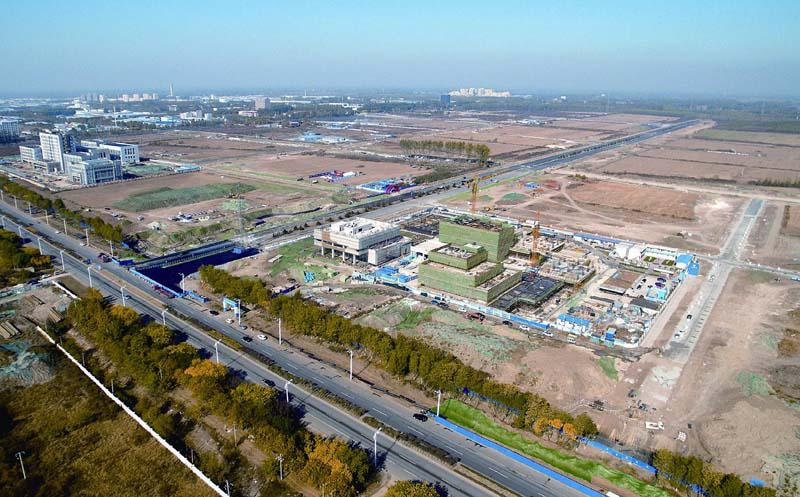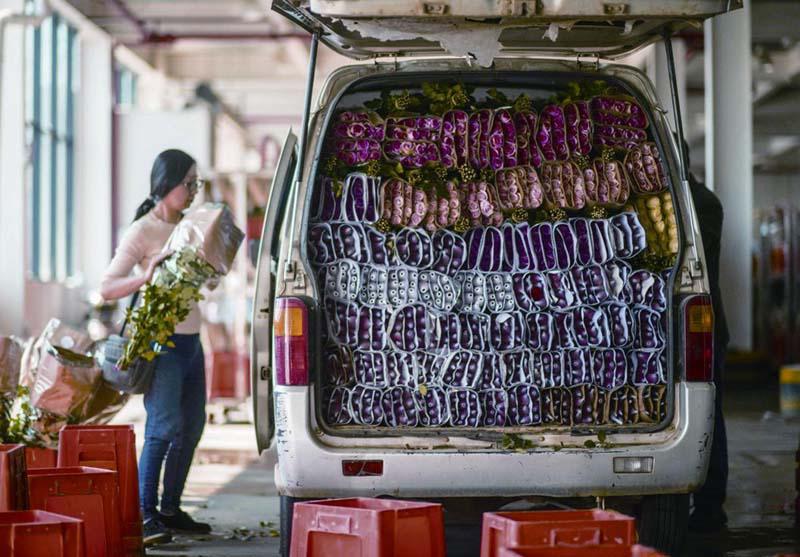Early-Spring Farming
2019-03-10

Orchardists work inside a cherry greenhouse at Baojiatan Village of Zanhuang County in Shijiazhuang, capital of north Chinas Hebei Province, on February 20.
Cutting Air Pollutants
Beijing plans to further cut the annual average conce ntration of PM2.5, a major pollutant, in its fi ght against unclean air, according to a plan announced on February 20.
The city will work to cut the annual and three-year average concentration of PM 2.5, as well as improve water and soil quality to meet its national targets set for 2020.
In 2019, Beijing will phase out 300 manufacturing and pollutionintensive enterprises, and gradually replace diesel-powered vehicles with new energy ones, according to the action plan released by the Beijing Municipal Ecological Environment Bureau.
The plan also noted that regulators will make differentiated plans with 50 major industrial enterprises to avoid a “one-size-fi ts-all” method in curtailing the output of polluting industries.
The citys average PM2.5 density dropped to 51 micrograms per cubic meter in 2018, down 12.1 percent year on year, according to the bureau.
Aquatic Product Safety
China will implement strict measures to ensure the safety and quality of aquatic products, although product safety and quality have improved in recent years.
Zhang Xianliang, a senior offi cial with the Ministry of Agriculture and Rural Affairs, said more than 97 percent of the products met standards according to market monitoring last year, up from 94.4 percent in 2013.
More efforts will be made by the ministry to supervise and provide guidance for the use of feed and drugs, Zhang said.
While establishing a mechanism for safety risk monitoring and assessment, the ministry will strengthen the prevention and control of aquatic animal diseases.
Last year, Chinas aquaculture output exceeded 50 million tons, accounting for over 78 percent of the countrys total aquatic product output, offi cial data showed.
China is the only country in the world that raises more aquatic products than it fi shes, according to the ministry.
Drunk Driving
China has launched a campaign to curb drunk driving across the coun- try, the Ministry of Public Security said on February 18.
Traffi c police nationwide should step up traffi c checks, including daily and regular inspections on the streets, according to a guideline released by the ministrys traffi c management bureau.
The one-year campaign is aimed at reducing the number of traffi c accidents and casualties caused by drunk driving, said the traffi c management bureau.
Drunk driving has long been one of the major causes of traffi c accidents in China. A total of 17,264 Chinese drivers were banned from driving for life in 2018. Among them, 5,149 were caught driving drunk in a serious traffi c accident.
High-Quality Agriculture
On February 18, China issued a plan to boost high-quality development of its agricultural sector through 2022.
The country will work to improve the quality of agricultural products, as well as the agricultural sectors effi ciency and international competitiveness, according to the plan jointly issued by the Ministry of Agriculture and Rural Affairs and six other ministries and government agencies.
Under the plan, the country aims to raise the per-capita agricultural productivity from 34,000 yuan($5,033) in 2017 to 55,000 yuan($8,141) in 2022.
To raise the sectors international competitiveness, the country vowed to foster the development of grain dealer giants and international agricultural conglomerates.
The country plans to increase agricultural product exports, which are expected to rise 3 percent annually during the period, according to the plan.
The country will also train more than 5 million professional farmers and raise the proportion of young and professional farmers.
Rural Financial Institutions
China saw a rapid expansion of rural fi nancial institutions last year as the country channels more fi nancial resources to serve the countryside.
China had 1,427 rural commercial banks by the end of 2018, up by 165 compared with the previous year, according to the China Banking and Insurance Regulatory Commission.
Village banks grew from 1,562 at the end of 2017 to 1,616 at the end of 2018.
There were 4,588 banking institutions in China at the end of 2018, up by 39 compared with the end of 2017.
China issued a guideline earlier in February to leverage more fi nancial resources to facilitate rural vitalization.
Oral Health
China will make efforts to reduce sugar intake among both children and adults, in a bid to improve the nations oral health, according to an action plan recently released by the National Health Commission.
Primary and middle schools, as well as nurseries, should restrict sales of high sugar beverages and snacks, said the oral health action plan covering the period from 2019 to 2025, which also required school canteens to offer less sweetened beverages and sugar-rich foods.
The country will encourage food manufacturers to use “reduced sugar” or “sugar-free” claims, and help consumers learn how to identify added sugar on nutritional fact labels, according to the plan.
A goal has been set to cut the caries rate among 12-year-old children from 34.5 percent in 2016 to less than 30 percent by 2025, the plan said.
It expects the average remaining teeth of seniors aged between 65 and 74 to reach 24 by 2025, while the fi gure was 22.5 in 2016.
Interventions will be strengthened to improve oral disease prevention and control, including a ban on smoking in public areas and education about the harms of the areca nut, one of the leading causes of oral cancer.
Dragon Dance
Members of a rural womens dance team perform the wooden-bench dragon dance celebrating the Lantern Festival, which fell on February 19 this year, at Yaokou Village in Hangzhou, capital city of east Chinas Zhejiang Province, on February 17. Yaokou Village is famous for its wooden-bench dragon dance, which originated in the Qing Dynasty (1644-1911).
Traditional Bookstores
Chinese readers, many of whom had switched to e-reading devices and online bookstores, are now fl ocking back to traditional bookstores which are offering a range of new products, China Daily reported on February 18.
The Bookdao New Publishing Institute, a consultancy to the countrys publishing and book industry, surveyed 62 chains and found that some 65 percent plan to open more than fi ve new stores this year and 18 percent of them will open over 100.
There were 225,000 bookstores and sales outlets in the country by the end of last year, up by 4.3 percent over 2017. Total sales of publications in the domestic retail sector reached 158 billion yuan ($23.3 billion), a year-on-year growth of 11.3 percent, the report said.
Dan Jie, who founded the popular Yanjiyou bookstore chain in 2013, was quoted as saying all his stores attach great importance to an elegant atmosphere and unique outlook. They also include coffee shops, art galleries and cultural products.
Some bookstores like Sisyphe also use big data technology to ensure the books in each store match the interests of consumers in a specifi c business district.
Industry insiders said the revitalization of bookstores is largely due to favorable policies that have been unveiled in recent years. The upgrading of cultural consumption has also helped the bookstore industry as consumers are now demanding greater quality content and improved lifestyles.
A Little Artisan
A girl displays her paper folding work during an event at Taiyuan Library in Taiyuan, capital of north Chinas Shanxi Province, on February 20.
Bill Swap
The Peoples Bank of China (PBC) conducted the fi rst central bank bill swap (CBS) operation on February 20 to support the issuance of perpetual bonds by commercial banks.
The CBS, valued at 1.5 billion yuan ($222 million), is open to primary dealers with a fi xed rate of 0.25 percent, according to a PBC statement. The swap will be due on February 20, 2020.
The scheme allows dealers to swap the perpetual bonds they hold for central bank bills, which will boost the market demand for perpetual bonds.
Perpetual bonds are fi xedincome securities with no maturity date. They are not redeemable but pay a steady stream of interest forever. They are often used to replenish capital for commercial banks, so they have better fi nancing capability to support the real economy.
In January, Bank of China issued the fi rst perpetual bonds by a Chinese bank. Those bonds were oversubscribed by investors including domestic insurance companies, securities fi rms and some foreign institutions.
CPI and PPI
The consumer price index (CPI), a main gauge of infl ation, rose 1.7 percent year on year in January, the National Bureau of Statistics (NBS) said on February 15.
The increase was down from 1.9 percent for December 2018.
Food prices climbed 1.9 percent year on year in the month, down 0.6 percentage points from December 2018, according to the NBS.
The price of pork, the staple meat of Chinese consumers, fell 3.2 percent year on year, a sharper decline than the 1.5-percent drop recorded in December 2018.
Non-food prices gained 1.7 percent year on year, the same growth as that in December 2018.
Prices in the educational, cultural and entertainment sector rose 2.9 percent year on year, while those in the medical and housing sectors increased 2.7 percent and 2.1 percent, respectively.
Gasoline and diesel prices declined for the second month in a row, down 6.2 percent and 6.5 percent, respectively.
The CPI for 2018 rose 2.1 percent year on year, up from 1.6 percent for 2017. The growth exceeded 2 percent for the fi rst time in the past four years but remained well below the governments target of about 3 percent.
The producer price index (PPI), which measures costs for goods at the factory gate, edged up 0.1 percent year on year in January, the NBS said.
It was down from a growth of 0.9 percent recorded in December 2018.
Prices of means of production entered the negative zone, edging down 0.1 percent year on year, according to the NBS.
Of major industrial sectors, the PPI in oil and natural gas exploration dipped 5 percent, compared with an increase in December 2018.
The PPI for non-ferrous metal smelting and rolling declined 3.5 percent, a sharper decrease than the 2.3-percent fall recorded in December 2018.
Unfolded Future
The Beijing-Tianjin Zhongguancun Science and Technology Park is under construction in Baodi District, Tianjin. The 14.5-square-km project will focus on artifi cial intelligence, intelligent manufacturing, new energy and new materials, biopharmacy and medical equipment, and high-end equipment manufacturing.
Energy Standards
China has unveiled the worlds fi rst technical standards on energy consumption of electric vehicles (EVs).
The national standards specify energy consumption limits for different types of EVs, according to the State Administration for Market Regulation on February 18.
It is expected to facilitate the application of EV energy conservation technologies and reduce energy consumption.
China is the worlds largest EV market, with new-energy vehicle sales soaring 61.74 percent year on year to 1.26 million units in 2018.
Wealth Management
The banking and insurance regulator has given the countrys largest lender the go-ahead to set up a wealth management subsidiary.
The Industrial and Commercial Bank of China has received approval from the China Banking and Insurance Regulatory Commission(CBIRC), the regulator announced on February 17.
Four other big lenders—the Agricultural Bank of China, Bank of Communications, Construction Bank of China and Bank of China—got the nod for the business in the past two months.
Rules were issued in early December 2018 for commercial banks wealth management branches to strengthen their risk management and support the real economy.
The CBIRC has received applications from several commercial banks, with more banks to follow suit.
The establishment of wealth management units will enrich the mix of institutional investors, bring more funds to the real economy and the fi nance market, and meet consumers diversifi ed needs, the CBIRC said.
Floral Trade
A vendor loads a van with roses at the Dounan Flower Market in Kunming, southwest Chinas Yunnan Province, on February 12. Dounan, Chinas largest fresh fl ower wholesale market, exports more than 500 varieties and 40 categories of fl owers to more than 50 countries and regions every day, among which 20 to 30 percent are sold to South and Southeast Asian countries.
FDI Up
Foreign direct investment (FDI) into the Chinese mainland expanded 4.8 percent year on year to 84.18 billion yuan ($12.58 billion) in January, the Ministry of Commerce (MOFCOM) said on February 14.
FDI for the service sector more than doubled that for the manufacturing sector, reaching 56.2 billion yuan($8.4 billion), MOFCOM data showed.
The hi-tech sector reported a robust FDI infl ow by growing 40.9 percent, with the hi-tech service subsector using 15.77 billion yuan ($2.36 billion), a year-on-year expansion of 113.4 percent.
FDI in central China reached 7.04 billion yuan ($1.05 billion), rising 11.6 percent year on year.
MOFCOM data showed that FDI from the United States surged 124.6 percent compared with January 2018, while that from countries along the Belt and Road increased 10.1 percent.
A total of 4,646 new foreigninvested fi rms were set up in the fi rst month of 2019, down 10.6 percent year on year.
Fintech Acquisition
Ant Financial, an Alibaba Group affi liate, announced on February 14 that it has taken over UK-based international payment group WorldFirst, marking the most signifi cant foreign fi ntech acquisition by the Chinese fi nancial services company.
Ant, operator of the leading payment platform Alipay, said in a statement that Alipay will work with WorldFirst to better serve global small businesses, promote inclusive fi nance and contribute to sustainable development.
WorldFirst, now a wholly-owned subsidiary of Ant, will continue to be headed by co-founder and CEO Jonathan Quin. The UKheadquartered company will continue its regulated business with global operations, including on the Chinese mainland and in Hong Kong.
Quin said the products and services of Alipay and WorldFirst are highly complementary and WorldFirst will be able to offer better products and services by becoming part of a larger group.
“By combining WorldFirsts award-winning currency account, international payments and currency exchange products with Ant Financials range of fi nancial technology solutions, we will advance our shared aim of building the best global platform for international trade and bring fast and affordable services to individuals, small and medium-sized businesses and online merchants around the world,” Quin said.
5G City
South Chinas technological powerhouse Shen zhen will launch pilot projects for the commercial use of 5G this year, local authorities said.
Shenzhen in Guangdong Province will install over 1,900 5G base stations this year, according to the citys bureau of industry and information technology.
The city is speeding up the construction of its next-generation information infrastructure and deployment of the Internet of Things and smart and connected vehicles.
Chinese cities are adopting the 5G network to meet public demand.
In late January, the Guangzhou Baiyun International Airport in Guangdong launched a 5G base station. An indoor 5G network will be installed in the Shanghai Hongqiao Railway Station by the end of this year.
Index Partnership
The G60 Hi-Tech Corridor Support Base at the Shanghai Stock Exchange (SSE) is inaugurated on February 15.
The corridor is an alliance of nine major cities in the Yangtze River Delta to promote infrastructure construction and improve the business environment. The SSE has signed a deal with the nine cities to set up the G60 Comprehensive Index and the G60 Component Index.
